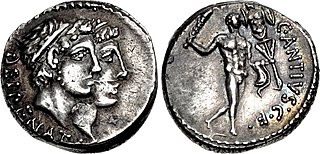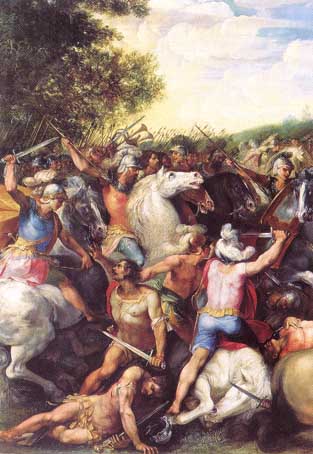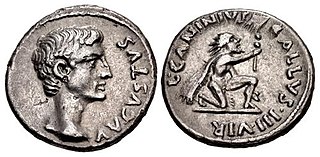Related Research Articles
The gens Gavia, or occasionally Gabia, was a Roman family of plebeian descent. It first appears in history during the first century BC, but none of its members obtained any of the curule magistracies until imperial times. The Gavi Arch at Verona was built in honor of one of the Gavii.

The gens Sempronia was one of the most ancient and noble houses of ancient Rome. Although the oldest branch of this gens was patrician, with Aulus Sempronius Atratinus obtaining the consulship in 497 BC, the thirteenth year of the Republic, but from the time of the Samnite Wars onward, most if not all of the Sempronii appearing in history were plebeians. Although the Sempronii were illustrious under the Republic, few of them attained any importance or notice in imperial times.

The gens Antia was a minor plebeian family at ancient Rome. The Antii emerged at the end of the second century BC, and were of little importance during the Republic, but they continued into the third century, obtaining the consulship in AD 94 and 105.
The gens Auria was a Roman family at Larinum in southern Italy, known chiefly from Cicero's oration, Pro Cluentio.

The gens Axia, also spelled Axsia, was a plebeian family at Rome during the final century of the Republic and the beginning of the Empire. The gens does not appear to have been particularly large or important, although at least some of the family were reasonably wealthy.
The gens Caelia was a plebeian family at ancient Rome. The nomen Caelius is frequently confounded with Coelius and Caecilius, with some individuals referred to as Caelius in manuscripts, while appearing as Coelius or Coilius on coins. Although the Caelii asserted their great antiquity, none of them attained any of the higher offices of the Roman state until the praetorship of Publius Caelius in 74 BC, and the first of this gens who obtained the consulship was Gaius Caelius Rufus in AD 17. The emperor Balbinus was a descendant of the Caelii.

The gens Hostilia was an ancient family at Rome, which traced its origin to the time of Romulus. The most famous member of the gens was Tullus Hostilius, the third King of Rome; however, all of the Hostilii known from the time of the Republic were plebeians. Several of the Hostilii were distinguished during the Punic Wars. The first of the family to obtain the consulship was Aulus Hostilius Mancinus in 170 BC.

The gens Maria was a plebeian family of Rome. Its most celebrated member was Gaius Marius, one of the greatest generals of antiquity, and seven times consul.

The gens Caninia was a plebeian family at ancient Rome during the later Republic. The first member of the gens who obtained any of the curule offices was Gaius Caninius Rebilus, praetor in 171 BC; but the first Caninius who was consul was his namesake, Gaius Caninius Rebilus, in 45 BC.
The gens Sextilia was a plebeian family at ancient Rome. The first member of this gens to achieve prominence was Gaius Sextilius, consular tribune in 379 BC. None of the family obtained the consulship, but they endured throughout Roman history from the early Republic into imperial times.
The gens Cincia was a plebeian family at Rome. The first member of the gens to achieve prominence was Lucius Cincius Alimentus, who was elected praetor in 209 BC.
The gens Egnatia was a plebeian family of equestrian rank at ancient Rome. Only a few of the Egnatii held any magistracies, of whom the most important may have been Gnaeus Egnatius, who held the praetorship during the second century BC, and served as governor of Macedonia, shortly after its institution as a Roman province.
The gens Erucia was a plebeian family at Rome. Members of this gens are first mentioned early in the first century BC; the name has been claimed as Etruscan. However, in the second century of the Empire, the Erucii attained considerable distinction.

The gens Fundania was a plebeian family at Ancient Rome, which first appears in history in the second half of the third century BC. Although members of this gens occur well into imperial times, and Gaius Fundanius Fundulus obtained the consulship in BC 243, the Fundanii were never amongst the more important families of the Roman state.
The gens Aviana was an ancient Roman family. They are known chiefly from the letters of Cicero, who was a friend of Gaius Avianus Flaccus, during the first century BC. There was also a writer of Fables by this name, who lived about AD 400, although it is not certainly known that they were related.
The gens Gellia was a plebeian family at ancient Rome, where they settled after the Second Punic War. The first of the Gellii to obtain the consulship was Lucius Gellius Poplicola, in 72 BC, but the most famous member of this gens is probably the grammarian Aulus Gellius, who flourished during the second century AD.

The gens Juventia, occasionally written Jubentia, was an ancient plebeian family at Rome. After centuries of obscurity, the gens emerges into history with the appearance of Titus Juventius, a military tribune, in the beginning of the second century BC. The first of the Juventii to obtain the consulship was Marcus Juventius Thalna in 163 BC. But the family is renowned less for its statesmen than for its jurists, who flourished during the second century AD.
The gens Luscia was a minor family at ancient Rome. Members of this gens are first mentioned in the early part of the second century BC. They were of senatorial rank, but few of them achieved the higher offices of the Roman state. The only known consul of this gens was Lucius Luscius Ocrea, during the Flavian dynasty.
The gens Mummia was a plebeian family at Rome. Members of this gens are first mentioned after the Second Punic War, and within a generation, Lucius Mummius Achaicus became the first of the family to obtain the consulship. Although they were never numerous, Mummii continued to fill the highest offices of the state through the third century AD.
Marcus Porcius M. f. M. n. Cato was the father of Cato the Younger. His promising political career was cut short by his sudden death, early in the first century BC.
References
- ↑ Dictionary of Greek and Roman Biography and Mythology , William Smith, Editor.
- ↑ Dictionary of Greek and Roman Biography and Mythology , William Smith, Editor.
- ↑ Valerius Maximus, Factorum ac Dictorum Memorabilium libri IX, vi. 2. § 10.
- ↑ Marcus Tullius Cicero, Pro Flacco, 23, 31, In Verrem , iii. 30.
- ↑ Marcus Tullius Cicero, Epistulae ad Atticum, xii. 28.
- ↑ Gaius Suetonius Tranquillus, De Vita Caesarum , "Augustus," 56.
- ↑ Aulus Gellius, Noctes Atticae, i. 6, xi. 13, xiii. 21.
![]() This article incorporates text from a publication now in the public domain : Smith, William, ed. (1870). Dictionary of Greek and Roman Biography and Mythology .
This article incorporates text from a publication now in the public domain : Smith, William, ed. (1870). Dictionary of Greek and Roman Biography and Mythology .{{cite encyclopedia}}: Missing or empty |title= (help)